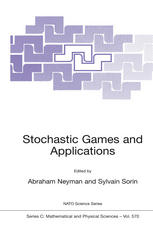

Most ebook files are in PDF format, so you can easily read them using various software such as Foxit Reader or directly on the Google Chrome browser.
Some ebook files are released by publishers in other formats such as .awz, .mobi, .epub, .fb2, etc. You may need to install specific software to read these formats on mobile/PC, such as Calibre.
Please read the tutorial at this link: https://ebookbell.com/faq
We offer FREE conversion to the popular formats you request; however, this may take some time. Therefore, right after payment, please email us, and we will try to provide the service as quickly as possible.
For some exceptional file formats or broken links (if any), please refrain from opening any disputes. Instead, email us first, and we will try to assist within a maximum of 6 hours.
EbookBell Team

4.0
46 reviewsThis volume is based on lectures given at the NATO Advanced Study Institute on "Stochastic Games and Applications," which took place at Stony Brook, NY, USA, July 1999. It gives the editors great pleasure to present it on the occasion of L.S. Shapley's eightieth birthday, and on the fiftieth "birthday" of his seminal paper "Stochastic Games," with which this volume opens. We wish to thank NATO for the grant that made the Institute and this volume possible, and the Center for Game Theory in Economics of the State University of New York at Stony Brook for hosting this event. We also wish to thank the Hebrew University of Jerusalem, Israel, for providing continuing financial support, without which this project would never have been completed. In particular, we are grateful to our editorial assistant Mike Borns, whose work has been indispensable. We also would like to acknowledge the support of the Ecole Poly tech nique, Paris, and the Israel Science Foundation. March 2003 Abraham Neyman and Sylvain Sorin ix STOCHASTIC GAMES L.S. SHAPLEY University of California at Los Angeles Los Angeles, USA 1. Introduction In a stochastic game the play proceeds by steps from position to position, according to transition probabilities controlled jointly by the two players.